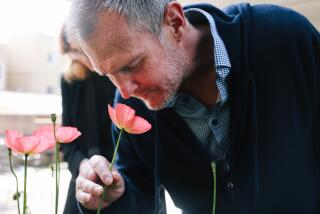Some Buddy to Lean On
- Share via
Bolstered by a deep faith in God, a wickedly dry sense of humor and a knack for careful listening, Jay Launt has volunteered for the past 10 years to be an emotional support buddy for people with AIDS.
By visiting, telephoning regularly, going to dinner, to church or maybe for a walk, the 50-year-old Fullerton man has been a shoulder to lean on for people with the disease, someone who cares and understands as the illness strips away health and independence, and a source of comfort when death nears.
At the AIDS Services Foundation in Irvine, which runs the program, Launt has one of the longest records of service. The agency serves 800 people with AIDS, 75 of whom are matched with buddies. Launt he has been a buddy six times, each time building a relationship that has lasted one or two years, waiting a month or two to mourn one buddy’s death, then beginning again.
“Committed and compassionate, that’s Jay,” said Raul Ramirez, volunteer coordinator for ASF. “The most important thing in a good volunteer is being there emotionally and spiritually and physically, and that’s what Jay does.”
Launt, who was reared in Santa Ana, served as a U.S. Army medic during the Vietnam War, treating hundreds of wounded flown to the Philippines after the 1968 Tet offensive. The experience, he said, was his introduction to death and dying.
After leaving the service, Launt became a Benedictine monk in an Episcopal order based in Toronto, Canada, and traveled to Tanzania and Liberia to work.
Launt left the order 14 years ago and returned to Orange County at a time when the AIDS epidemic was mushrooming. He wanted to find a way to help. “I decided either I was going to go meet AIDS or it was going to come to me.
“I grew up in a religious tradition that said you put your feet and hands where your mouth was,” Launt explained. “I believe in a social application of the gospel, so that’s what I try to do.”
In a buddy relationship, expressions of anxiety, fear and heartache are the prerogative of the person with AIDS; the role of buddy requires emotional and spiritual vigor. Each relationship is different, Launt said, and how much the pair interacts or how close it becomes is up to the person with AIDS.
“It takes a couple of months to determine how the relationship is going to play out, but in general, I try to open myself and my home to them as much as they want,” Launt said. Some have become very much a part of his life.
“After my first buddy died, I continued to expect him to come around the corner for a couple of years,” Launt said. “I’d see other people who looked like him and think, ‘Oh, there he is.’ ”
Emotional-support volunteers can be consumed by the task, so Launt said he is careful to keep his perspective and to balance his life with other friends, dinner parties, church activities and travel.
“Jay comes across as Mr. Professional and down to business, but he’s actually really funny, and inside he’s a big ole softy,” said Cindy Roll, another emotional-support volunteer at ASF.
“He’s very organized and meticulous, but at the same time you can get to him in a heartbeat--he just melts,” Roll said.
Launt is a buddy to Steve, a Garden Grove man who asked that his last name not be used.
Steve has a strong support network of family and friends, he said. But Launt provides something none of them can: “With everyone else you’re kind of constantly on guard,” he said. “I don’t want to appear too sick to them, so when I’m with him it’s like a pressure-relief valve.”
The two go to dinner or play miniature golf. Steve has gone to Launt’s church, and sometimes they talk over a cup of coffee.
“He’s someone who’s not patronizing, and that’s important,” Steve said. “Most people, unless I have to, I never tell I’m sick. If you do, then they treat you differently and try to do things for you that you don’t need to be done. It’s the most frustrating thing because you want to do as many things for yourself as you can.”
A new generation of medications called protease inhibitors, which came into popular use about three years ago, have helped prolong Steve’s life. They also have brought a troubling uncertainty about the future.
“It sounds funny, but one time I thought death at some point was certain,” he said. “That was almost easier to cope with than the unknown--you could kind of begin closure. Now it’s, ‘Am I going to feel better? Will I feel well enough to go back to work?’ ”
Nine years ago, Steve was diagnosed as positive for HIV, the virus that causes acquired immune deficiency syndrome. Two years ago, he developed AIDS. Doctors say they have little experience treating such long-lived patients and can’t say what his prospects are.
Launt said that recognizing and respecting the uncertainty and diminishing sense of independence facing Steve, or anyone with AIDS, is his main function as a buddy.
“The thing they’ve all had in common is this lack of control over their lives,” Launt said. “They can feel like doctors are controlling them; the disease is controlling them; unemployment is controlling them, or the state of California is controlling them--through disability, if it’s approved.”
If Launt can’t solve problems for his buddy, he can at least be a sounding board.
“At times like that the only thing you really can do is be there for somebody,” Launt said. “So that’s what I do. I listen.”
More to Read
Sign up for The Wild
We’ll help you find the best places to hike, bike and run, as well as the perfect silent spots for meditation and yoga.
You may occasionally receive promotional content from the Los Angeles Times.






